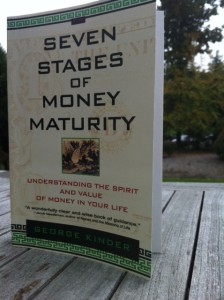George Kinder, father of the Life Planning movement and founder of the Kinder Institute of Life Planning, talks to us about the first of his books on the integration of financial planning and the human condition, The Seven Stages of Money Maturity, in the latest installment of the Books We Trust author interview series.
 Life Planning
Life Planning
Trusted Advisor Associates: George, I don’t know of any other book that reaches so far across the right brain / left brain divide. Or is it the money / spirituality divide? In any case, you manage to integrate asset category management with the Buddhist Bodhicaryavatara.
What is it that you’ve done here? What is this thing called Life Planning?
George Kinder: We have gotten stuck thinking of money as about counting, about numbers, something abstract done by banks and accountants. The truth is, money is a much larger topic—it involves our whole human nature. I talk about the conversation that needs to take place before a financial plan can be done. That conversation is all about the human being, so we can go into emotional and creative territories. It requires a different way of listening.
Most financial planners don’t think this way. They were brought up on old sales approaches. Life insurance was the first product; it got encrusted with sales techniques. Then we got to stocks, which have always represented a commodity to people. So we’ve never had a consciousness that money has a purpose connecting it to our passions and our deeper levels of meaning.
A group of us around the globe said, this is not the way it should be, and we set about to change it. Is there a client relationship dividend to re-thinking this approach? There sure is, and it’s huge.
TAA: Lest I give readers the wrong idea, this book and your work are part of mainstream, hardcore capitalism. You are highly regarded among financial planners and wealth managers, people to whom other people entrust the management of their money. This is not fluff stuff, and your clients are as sober and conservative as any.
George: Let’s touch on your “mainstream hardcore capitalism” language. That’s an important message for my and your audiences alike. We have a secular financial system that has basically failed. It’s in collapse. The trust level for financial advice is so low these days partly because you have to question the sustainability of our very system.
A Dow Jones survey from a few years ago (Dow Jones Wealth Management, After the Crunch) said 75% of consumers who have a financial advisor would never recommend that advisor to a colleague or friend. How horrible is that!
The trust issue is threatening what we think of as hardcore capitalism. We believe in supply/demand and efficient markets, but the proper reverence for a vital system isn’t there, and without that quality of reverence the whole system is threatened. You can’t have a trust relationship built around nothing but avarice and sales.
TAA: Who are your clients? Who needs and hears your message?
George: We at the Kinder Institute work with three different markets. The Seven Stages book was written for the consumer. That’s one market, which I’ll expand on in my new book called Life Planning, co-authored with Mary Rowland.
The second client group is independent financial advisors, usually CFPs or the various global equivalents. We work with advisors in 23 different countries.
The third group is corporate clients; we’re moving into markets in North America and Europe, mainly the UK.
Companies are in danger because their products are commoditized and sales-driven, and consumers have had it with the old approaches. Consumers need this more human approach because they’re dysfunctional when it comes to money, and because they have no one to talk to about it. And advisors need it because their model also is being challenged; they’re all scrambling to figure out what a client-service model looks like.
There are enormous opportunities for all concerned.
Integrating Art and Finance
TAA: How is it you came to write such a book? You were an artist who became an accountant—but you kept both sides of your personality. That’s unusual.
George: I was an accountant because I had to be, I had to make a living. Following your bliss didn’t work for me—I tried it, but I couldn’t make money from my paintings or my poetry. But I developed a strong business sense from the accounting, and that became the basis for my business now.
I was an over-achiever: despite the artist in me, I had 800s on my math boards, but lousy verbal skills. I was competitive and cocky so I majored in English–I figured I already knew how to do Math.
TAA. You talk about people’s profound relationship to money. People would sooner talk about their sex lives than their money lives, and money is the source of profound psychological meaning, or dissatisfaction.
Your narrative of progression to Money Maturity parallels that described in Buddhism for personal growth. What’s the connection with money?
George: Human growth has to mirror the growth of our relationship with money, because money enables so much of our lives. I like to say there are far more money apps for human beings than there are computer apps in the app store, because money facilitates everything in life. People have dysfunctional relationships with money and they have trouble getting advice about it.
Buddhism? I taught meditation for 25 years, and led week-long silent meditation retreats in each of those years; I just came out with a book on meditation—a secular book, not a religious one. When we train financial advisors to listen really well to their clients, we start those practices with “inner listening,” which is basically a meditative practice.
If you’re not aware of what’s going on inside you, you can’t separate your own thoughts and feelings from those in your clients. We’re highly cerebral in our normal lives, and when talking with clients, we need to be much more connected with our emotions, and with theirs.
Financial Planning Today
TAA. Your earliest version of your seminar was called “12% in 12 Years,” and it was about how you could achieve financial independence. That was then. Now, the Dow sits where it was a decade ago, and bonds are yielding low single-digit returns. Very low.
It’s got to be harder to achieve financial nirvana these days; how do you advise people now?
George: When I was giving the 12-and-12 it was an exhortation to consumers to save 12%, not to earn 12%. So you compound as best you can, and you simplify—both while you’re earning, and when you retire. You ought to be able to have modest financial independence. That’s still true, but obviously when you look at the yields of the last decade, it’s a much harder task to accomplish.
One of the values of life planning is it gets away from the numbers and gets down to what’s really important. What’s most important is actually much easier to achieve than when it’s all about money.
TAA: Most financial advisors just jump into discussions of required spend levels, rates of return, financial risk profiles, and so forth. They forget the entire front end—why is it that we’re doing this stuff in the first place?
I sometimes think that the financial planning industry is the most product-driven business I know: they can’t even graduate from features to benefits, much less to goals.
George: In Life Planning we look at goals deeply and seriously. What people care about most is their family. Four other things come close to it, but they’re mainly concerned with family, spouse, and relationships.
The next most common response has to do with values: not living their values the way they’d like. Maybe their job threatens their integrity; (sometimes it’s explicitly religious or spiritual, though that’s true more in the US than in Europe).
The third most common goal is a wild creativity; the fourth is community and the fifth the environment or sense of place–typically people talk about a move to the city or the country.
And all these things are doable! This puts the advisor in a much stronger role, focusing on what the persons really care about, rather than trying to force money itself to do all the heavy lifting. We help them live with passionate purpose.
TAA. Financial planners and wealth managers come in many forms these days. What roles do you see being played by the Financial Planning Association, by the National Association of Personal Financial Advisors (NAPFA), by your own Kinder Institute, and by similar associations outside the US? What’s been the evolution of brokers and independents? Does the fiduciary movement have legs?
George: The fiduciary movement definitely does have legs. For the first time in a long time, this movement toward client centricity is happening more outside the US than inside. We’ve been ahead in the past because of things like NAPFA, life planning, the emphasis on the fiduciary. These movements grew up here because of the entrepreneurial spirit of America. But it’s been almost 30 years since I joined NAPFA, and there’s still a lot to be done.
We’ve gone far in America, but we’re not the leaders any more. The leadership is now coming from governments in places like India, the Netherlands, Australia and the UK. The regulators in those places have said “enough already.”
The industry in those countries recognized they needed to shift away from the heavy sales and commission system, because of lower and lower levels of trust. Those countries are now leading with ways that make Dodd Frank look like just a piece of paper.
Dodd Frank takes the consumer back to the Investment Advisers Act of 1940. We should have been there all along. Dodd-Frank is sort of Back to the Future.
The cozy relationship that grew up here between industry and government meant brokers could insist to the SEC, “No, we’re not advisors, we’re salespeople not subject to the Act,” and then turn around and tell the customers the exact opposite. Dodd Frank basically says (as yet unconvincingly) we’re going to enforce the 1940 Act. Meanwhile, other countries are going much further.
I’m not optimistic short term here in the US, though I continue to be an optimist about the long run. Eventually the consumer wins. The model we have in America is not designed for the consumer like it is in other countries. But I have faith we’ll get back there again.
The Stages of Maturity
TAA: In the Seven Stages you write about how the tension between the first two stages is particularly poignant—the crunch that happens when Innocence (Stage 1) comes up against Pain (Stage 2). How can people recognize that tension?
George: Innocence and Pain are the first two of the Seven Stages, and there’s a bit of psychological approach here. It’s like being in childhood. Innocence is our beliefs about money; every single belief you can imagine is partial and incomplete.
The more insidious innocent beliefs are things like, “Spend today because you never know about tomorrow,” or, “The only way to get money is to borrow it,” or, “Be ever on guard against those who’d steal it from you.” Investment schemes will often play against that last one, as in, “Do you know how the rich really get their money?” I call these beliefs Innocence because they’re all incomplete. We pick these deep beliefs up early in life, from our parents.
Then comes the Pain, when your beliefs turn out to be wrong. Pain is primarily emotional. You see your neighbors doing well but you don’t invest because your grandparents were from the depression. Meanwhile, your neighbors get yachts; so your particular brand of pain is envy.
Then, say in October of 1987 you go all in, and you do it on margin. More pain. You get anger, sadness, despair, frustration, all of those things. And people get in a loop, going back and forth between Innocence and Pain.
TAA: What’s the biggest mistake made by financial planners? And by their clients, in their relationship to their financial planners?
George: The biggest mistake made by financial planners is that even if they’re honest, have integrity, and care about their clients–they don’t know the clients well enough. They don’t know enough to know how much to save, how much to put into retirement, and how to help the client not worry so much and to live their dreams.
It’s a tragedy. They don’t know how to develop the biggest opportunity they have–the opportunity to talk meaningfully to their clients. If they could do that, they could say, “Hey, you can have that, let’s make sure you move toward your dreams.” Instead, it’s all about shovels—not about holes.
And it’s even more of a tragedy for the consumer; they’re still thinking that it’s all about the money. They think their job is to find an advisor who can beat the market.
What they need is someone they can really trust; someone who has the capacity to help them articulate what they’re really inspired about in life, so that they can use money as a means to that end.
TAA: George, thank you very much for taking the time to speak with us. Your ability to link our material and our spiritual lives is unparalleled, and I hope we help sell you a few more books—they help people.
George: My pleasure.
Books We Trust interviews include:
 The term “financial advisor” covers a wide range of activity, from insurance sales to asset manager to broker to financial planner, and many more. Both providers and consumers of financial advisory services are well advised to get some perspective about this business.
The term “financial advisor” covers a wide range of activity, from insurance sales to asset manager to broker to financial planner, and many more. Both providers and consumers of financial advisory services are well advised to get some perspective about this business. Charlie: What’s driving this move? What’s been the customer experience of the financial advisory business over the past 30 years? The past 10?
Charlie: What’s driving this move? What’s been the customer experience of the financial advisory business over the past 30 years? The past 10?
